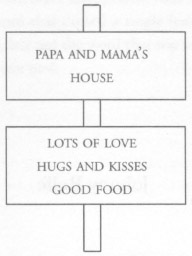
Johnny Rolfe
To the one whose existence I doubt:
We parallel the river’s southward course. Our progress is glacial. Long swathes of the old road are gone. Often we know we’re on what used to be the road only by the signs that remain on what used to be its side: FARMLAND-FRESH PRODUCE, BUMPER-TO-BUMPER AUTO PARTS, FRIENDLY MOTEL, MOOSE LODGE, CHRISTIANA CHICKEN SHACK, SHAFT OX CHIROPRACTIC, OASIS CAR WASH, MIRACLE DELIVERANCE TABERNACLE, SPEED LIMIT ENFORCED BY AIRCRAFT, DRUG-FREE SCHOOL ZONE: linguistic detritus of history, voices from a past we hope to reclaim, lonely notes our forebears wrote in code to tell us how to find them. WHISPERING PINES MOTEL, MASON-DIXON SPORTS COMPLEX, CRAFT EMPORIUM, SELF-EMPLOYED HEALTH INSURANCE, OTHELLO, BAIT AND TACKLE, TEMPERANCE, WILDLIFE REFUGE, FREE WATERFRONT CATALOGUE 7000 FEET.
We passed another trading post today. Everyone but Jack Smith, the red-haired mechanic, who’d had to slice John Martin’s face, shunned this one. We stopped for lunch; Smith removed a red wagon full of paltry trinkets from the trailer of supplies behind the bus and went to the post alone on foot. I gazed through the scuffed-up glass at the most compelling sign of all:

I would have risked my life to find who made that sign, but the house it stood before and described had become a house-shaped square of ash, so I stayed put.
An hour later Martin, whose face there was a little less of now, said, “Let’s leave without Smith.”
“I’m not going anywhere,” the driver said.
Others said:
“Let’s wait an hour, then go after him.”
“Let’s wait an hour, then leave.”
“Let’s kill him when he gets back, if he isn’t already dead.”
“Let’s go after him now, he’s been gone long enough, something bad’s happened.” (That was me.)
“Let’s send you in after him alone,” Martin said.
I said, “I know it stings to get punked by someone of a lower social station, Martin.”
He came at me along the bus’s wide central aisle, a blur of bandages deep brown with dried blood. I removed from my pocket the very handheld device on which I’m now describing this and jammed it in his knee. He howled and fell and howled. He wouldn’t walk again for hours at least, and thus I’d saved him from a dozen fights, a munificent gesture, almost as if I’d used this thing to communicate something of value.
Against my own best sense, I want to know John Martin—not know him tactically to know what he’ll do next so I can do it to him first, I mean I want to know him in the useless way people know. He’s small and pale, fine-boned and quick, a meticulous dresser and a dirty fighter with a high, elegant forehead. With his speed and size, his wont to bite and scratch, he fights well in a cramped space. The syllogism of his inclusion on this trip: he’s good at number crunching, he’ll bite off the finger of his assailant, let’s include him on this trip. And Martin’s a born executive—one of that class of men who make or know the secrets that define the contour of our lives without our knowledge, secrets one hundred molecules of which the rest of us inhale with every breath. You can tell he’s one of them by how he wears his suit. Even when it’s soiled and scuffed, stained with blood, and stinks of fear and rage, Martin’s suit attends his body as the air attends an eagle’s wing.
We on this bus are brothers by default. We breathe each other’s breaths, fumes, and farts. That a flake of Martin’s shed skin, while riding the currents of the bus’s inner wind, should land on my lunchmeat is a likelihood too great not to make my peace with. The enmity of my neighbor is rent I pay for life on earth. I love the man who hates me and I know that if what I need badly enough can be obtained in no other way I’ll kill him for it.
Darkness has arrived. I’m reclining on my bunk on the starboard side of the bus, caressing the small, soft qwerty keys of my wireless device. Diagonally across from me, lit by candlelight, the forlorn-faced, bloody-foreheaded Martin runs the front of his wounded fingers lightly over the set of brass balls even an adversary must admire.
“What are you staring at?” he says.
“I’m not your enemy, Martin.”
“Yes you are.”
“What do you want?”
“What?”
“What do you want out of this trip?”
“Same as everyone: live long, get rich.”
“At any cost?”
He doesn’t answer me, the question is evidently too stupid.
“What about ensuring the survival of the community?” I say.
“That’s a little grandiose for me, let me think about it.”
I’ve observed that if I beat a man in a fight in the afternoon, he will give my ideas serious consideration in the evening.
“Well,” he says, “I haven’t killed you yet and you haven’t killed me yet.”
“I think a civil society means you can go to sleep not having to be actively thankful no one’s killed you since you woke up.”
“What the hell are you typing?”
“Our conversation.”
“Type this: fuck you.”
“Thanks, I just did. Do you love anyone, Martin?”
“What?”
“Is there anyone you love?”
“You cripple me and ask me that?”
“Yes.”
“Yes. I love a few people. But I already know them. I don’t see the point of loving anyone new. All new people are just variables, stand-ins for each other, it doesn’t matter who they are or how you treat them.”
“That sounds like a recipe for unhappiness.”
“Like you’re so happy, Rolfe. Hope you don’t get murdered in your sleep. Good night. Up yours.”
“Where do you think Smith is?”
“Also up yours, I would guess.”